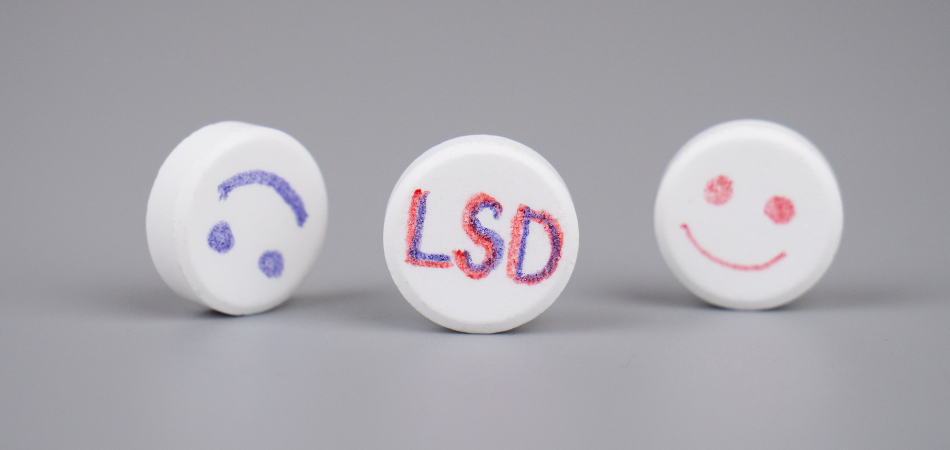
Written by:

Medically Reviewed by:
Last Updated:
February 14th, 2025
Hallucinogen Addiction
What are hallucinogens?
Hallucinogens are a category of drugs that alter perception, mood and various cognitive processes, often leading to visual, auditory or tactile hallucinations. Unlike other substances that primarily stimulate or depress the central nervous system, hallucinogens work by disrupting how the brain and nervous system process information.

Are there different types of hallucinogens?
When people hear the word ‘hallucinogens’, the first thought often goes to LSD, commonly known as ‘acid’. However, there are actually several drugs classified as hallucinogens, each with unique effects and often different street names. These drugs vary widely in their impact on perception, mood and cognitive processes and understanding them is key to knowing the range of experiences they can induce.
Here’s a breakdown of some commonly known hallucinogens:
| Name | Street Name | Effects |
| LSD (Lysergic Acid Diethylamide) | Acid, Blotter, Tabs | Alters visual perception, mood and thought patterns; can cause hallucinations, time distortion and synesthesia. |
| Psilocybin (Mushrooms) | Magic Mushrooms, Shrooms | Euphoria, altered thinking, visual and auditory hallucinations, a distorted sense of time. |
| DMT (Dimethyltryptamine) | Dimitri, Spirit Molecule | Intense, short-lived hallucinations, out-of-body experiences, vivid visualisations, altered perception of reality. |
| Mescaline | Buttons, Cactus, Mesc | Alters visual and auditory perception, creates a feeling of euphoria, visual hallucinations. |
| PCP (Phencyclidine) | Angel Dust, Peace Pills | Dissociation, numbness, hallucinations and mood swings; can cause detachment from reality. |
| Ketamine | Special K, K, Cat Valium | Dissociation, sensory distortion, reduced awareness of pain, feelings of detachment. |
| Salvia Divinorum | Magic Mint, Sally-D | Distorted perception of reality, detachment, time distortion, visual hallucinations. |
| MDMA (in high doses) | Ecstasy, Molly | Enhanced sensory perception, emotional warmth, altered sense of time; high doses may cause mild hallucinations. |
| Ayahuasca (DMT Brew) | Tea, Yagé | Vivid hallucinations, introspection, emotional release, altered sense of time and reality. |
Are hallucinogens addictive?
While most hallucinogens aren’t physically addictive like cocaine or heroin, they can lead to a strong psychological dependence. This psychological pull often stems from the way these substances affect perception and emotions, creating experiences that many feel they “need” to revisit.
For some, the appeal lies in the profound sense of escape. Hallucinogens can provide a break from reality, allowing them to explore intense sensations, altered states of consciousness or even self-discovery.
The drive to revisit these experiences can grow strong, especially if they become a way to cope with underlying issues or escape life’s challenges. Over time, the desire to chase these feelings can lead to a pattern of repeated use, making it hard to stop even without physical withdrawal symptoms.
Are hallucinogens dangerous?
While hallucinogen addiction isn’t typically associated with direct fatalities, it does pose significant dangers that are often overlooked. Unlike other substances where overdose can lead to immediate death, hallucinogens generally don’t cause direct toxic effects that are fatal. However, the altered perceptions and disorienting effects can lead to dangerous behaviours, such as reacting to hallucinations in ways that put the person at risk.
For instance, someone under the influence might misinterpret a hallucination and accidentally harm themselves or others, potentially resulting in serious injury or even death due to risky actions taken while disoriented.
Hallucinogens like MDMA, although not hallucinogenic in the traditional sense, come with unique risks as well. MDMA users need to maintain hydration, yet some have unknowingly consumed excessive amounts of water due to heightened thirst, leading to a potentially fatal condition known as water intoxication. This underscores how subtle, seemingly manageable risks associated with hallucinogens can still lead to life-threatening outcomes if not carefully managed.
Moreover, there’s also the lasting impact of hallucinogen use on mental health, such as Hallucinogen Persisting Perception Disorder (HPPD). This condition can result in enduring visual disturbances long after the drug has been metabolised, leading to ongoing stress, anxiety and disruption of daily life.
Although rare, HPPD can be a lifelong issue for some, illustrating that while hallucinogens might not be directly fatal, their effects can ripple out to affect mental health and overall well-being in lasting ways.
What are the signs of hallucinogen addiction?
While we don’t promote the use of any types of drugs, if you are using hallucinogens, it’s crucial to recognise the signs of addiction. Hallucinogens can alter how you perceive reality, and their effects can vary widely from person to person. Knowing the behavioural and psychological signs can help you or someone you care about identify when casual use may have crossed over into addiction.
Behavioural signs
- Constant craving for hallucinogens: An urge to experience altered states more often than before. For example, if you find yourself thinking about the next opportunity to use them even while sober, this craving might indicate dependence.
- Disruption of daily routine: Regular responsibilities, like work or social commitments, may start to feel less important compared to getting or using hallucinogens. If you’re frequently rescheduling or missing important events because of usage or recovery from effects, this could be a red flag.
- Neglecting personal and social relationships: Friends and family may notice that you’re becoming distant, particularly if they don’t approve of your hallucinogen use. Spending time with people who encourage this behaviour over other supportive relationships may indicate a growing dependency.
Psychological signs
- Increased tolerance: Needing to use more to feel the same effects or experiencing diminished returns from the usual amount. Higher doses are needed to reach the same visual or sensory experiences as before.
- Mood swings or emotional instability: Because hallucinogens impact brain chemistry, you may experience unexpected emotional highs or lows, even while not using. For example, feeling anxious, irritable or empty in between usage could be a sign of dependency.
- Preoccupation with hallucinogenic experiences: An obsession with past or future trips, which can lead to difficulty focusing on anything else. If you’re constantly reliving certain memories from these experiences or can’t stop planning your next trip, this might signal an emotional reliance.
Can Liberty House help with a hallucinogen addiction?
At Liberty House, we’re here to guide you through the recovery process with a programme designed to address the unique challenges of hallucinogen addiction. Our approach begins with a thorough assessment, allowing us to tailor a treatment plan that best meets your individual needs.
Our detox process focuses on helping you manage any psychological impacts the drug may have had, providing a supportive and safe environment where you can start your journey to recovery. From there, you’ll have access to traditional therapies, such as DBT and group counselling, as well as holistic therapies, including yoga and art. These therapies work together to help you build resilience, develop coping strategies and restore mental clarity.
Once you complete the main programme, our aftercare services are here to support your transition back to daily life, ensuring you have the resources and connections needed to maintain your progress.
At Liberty House, we’re dedicated to helping you rediscover a fulfilling, drug-free life. Contact us today to begin your journey to sobriety.
Frequently Asked Questions
(Click here to see works cited)
- Salathe C, Blanc AL, Tagan D. SIADH and water intoxication related to ecstasy. BMJ Case Rep. 2018 Aug 29;2018:bcr2018224731. doi: 10.1136/bcr-2018-224731. PMID: 30158258; PMCID: PMC6119400.
- “Hallucinogen Persisting Perception Disorder (HPPD).” WebMD, WebMD, www.webmd.com/mental-health/hallucinogen-persisting-perception-disorder. Accessed 29 Oct. 2024.







